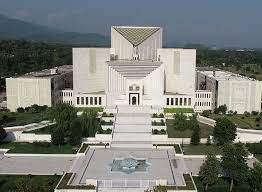Beyond Individual Fates
The Supreme Court of Pakistan has finally drawn a line under the tumultuous debate surrounding Article 62(1) (f), striking down the draconian provision that imposed lifetime disqualification on lawmakers. This groundbreaking ruling, while potentially paving the way for the political return of figures like Nawaz Sharif and Jahangir Tareen, extends far beyond individual beneficiaries, demanding a critical appraisal of accountability and democratic principles.
Shadow of “Perpetual Punishment”
Pakistan’s Supreme Court has taken a bold step towards rectifying past errors. But the journey towards a just and robust democracy is far from over. Embracing critical introspection, demanding legislative reform, and upholding the inherent power of the electorate are the vital next steps on this crucial path. Chief Justice Isa’s poignant remark, lamenting the superficial reading of the Constitution, rings true.
The 2018 “perpetual punishment” verdict, built upon dubious interpretations, cast a long shadow over Pakistan’s political landscape. While the immediate benefits for the House of Sharif and Mr. Tareen are undeniable, it’s crucial to avoid the myopia of partisan analysis.
This verdict transcends individual fates. It signifies a bold assertion against judicial overreach, as Justice Khakwani’s earlier observation on limited electoral authority aptly illustrates. Setting clearer, realistic standards for disqualification will not only enhance due process but also streamline the legislative process, moving away from tainted proceedings.
Dangers of Subjective Morality Tests
Though, the timing of this landmark judgment raises questions. One cannot ignore the immediate beneficiaries, sparking concerns about the potential derailment of democracy. Advocate Bhandari’s cautionary words underscore the need for absolute transparency and fairness in judicial interpretations. Ultimately, justice must be demonstrably seen to be done.
This judgment marks a watershed moment, not just for individual politicians but for the very fabric of Pakistani democracy. While immediate implications grab headlines, we must delve deeper. Scrutinizing the flawed logic of the original verdict, and recognizing the dangers of subjective morality tests as qualification criteria, are crucial steps towards a healthier political ecosystem.
Elected Government’s Turn
The onus now lies on the elected government to re-evaluate Article 62(1)(f). Can we truly embrace democratic principles while retaining vague, potentially weaponized provisions? Is it the judiciary’s role to dictate who is “morally deserving” of leadership? These are the questions that demand immediate attention, for ultimately; it is the voting citizenry who should hold the reins of political choice.
Revoking a lifetime prohibition on politicians with convictions from participating in political campaigns, the Supreme Court has definitively concluded a heated debate surrounding Article 62(1)(f). At present, this decision brings favorable conditions for the House of Sharif and, less conspicuously, for Jahangir Tareen.
Timing and Transparency
With the Sharif family poised for the fifth prime ministership and Mr. Tareen in a more comfortable position to lead his newly established IPP in the polls, the narrative extends beyond these two figures, contrary to politically charged commentaries.
Expanding on his previous statements during a hearing, the Chief Justice of Pakistan expressed regret on Monday over a superficial or selective reading of the constitution, likening it to ignoring the constitutional history of Pakistan.
To comprehend the undoing of the harsh imposition of “perpetual punishment,” a broader perspective is required. While the PTI may not grasp it immediately, the top court’s bold stance against playing god is a commendable move.
The Ishaq Khakwani case emphasized the limited scope of election authorities and courts in deciding the wisdom of any individual, urging a shift toward more realistic standards of human behavior and corresponding punishments to expedite legislative processes.
Despite the merits of the decision, questions linger about the timing of this revelation and who stands to benefit immediately. Advocating caution in interpretations, legal counsel Uzair Karamat Bhandari emphasizes the need for courts to avoid actions that could derail democracy. Ultimately, justice must be visibly and undeniably done.
In a curious twist, the Supreme Court, by overturning its judgment in the Samiullah Baloch case, nullified the lifetime disqualification of lawmakers. The 6-1 majority verdict proclaimed that no one can be barred from contesting elections for life under Article 62(1)(f).
The controversy surrounding lifetime disqualification dates back to the Samiullah Baloch case, where critics argued that the decision to disqualify Nawaz Sharif for life had unintended consequences, benefiting Imran Khan’s rise.
More Than Political Beneficiaries
Monday’s verdict corrects a historical wrong, ensuring that a politician’s entire career is not determined frivolously. The decision opens the path for Nawaz Sharif’s potential fourth term as prime minister and shields Imran Khan from lifetime disqualification despite his conviction. However, the myopic focus on immediate beneficiaries rather than the legality of the original judgment is a common trend.
Article 62’s lethal impact
The recent rectification of Article 62’s lethal impact on politicians marks a significant development. The ‘lifetime disqualification’ aspect, introduced five years ago, was interpreted to permanently bar individuals from public office based on a morality test.
Monday’s verdict acknowledges the overreach of the previous bench, emphasizing the lack of a clear legal framework for such disqualifications.
While the news is positive, the clause remains intact, awaiting potential legislative amendments. The eligibility requirements for public office, based on morality, have long been criticized as unrealistic and subjective, urging reconsideration and a reliance on the judgment of the voting citizenry rather than arbitrary conditions dictated by law.


